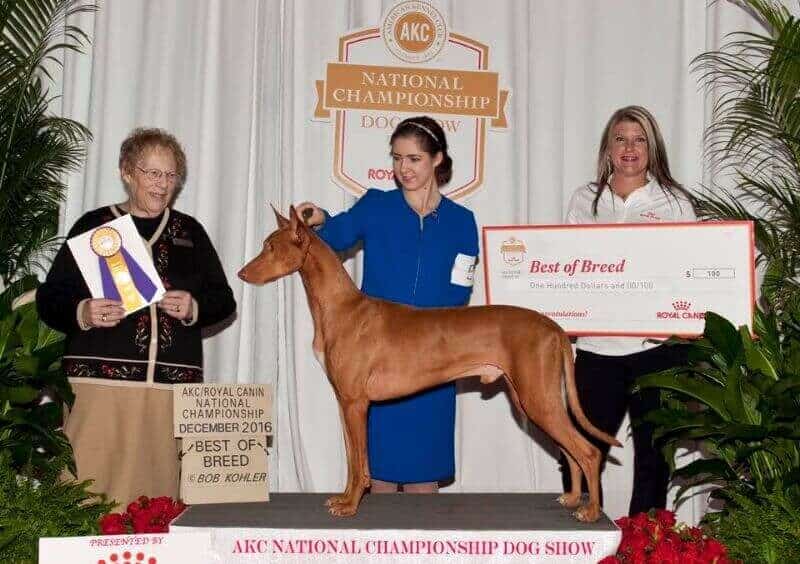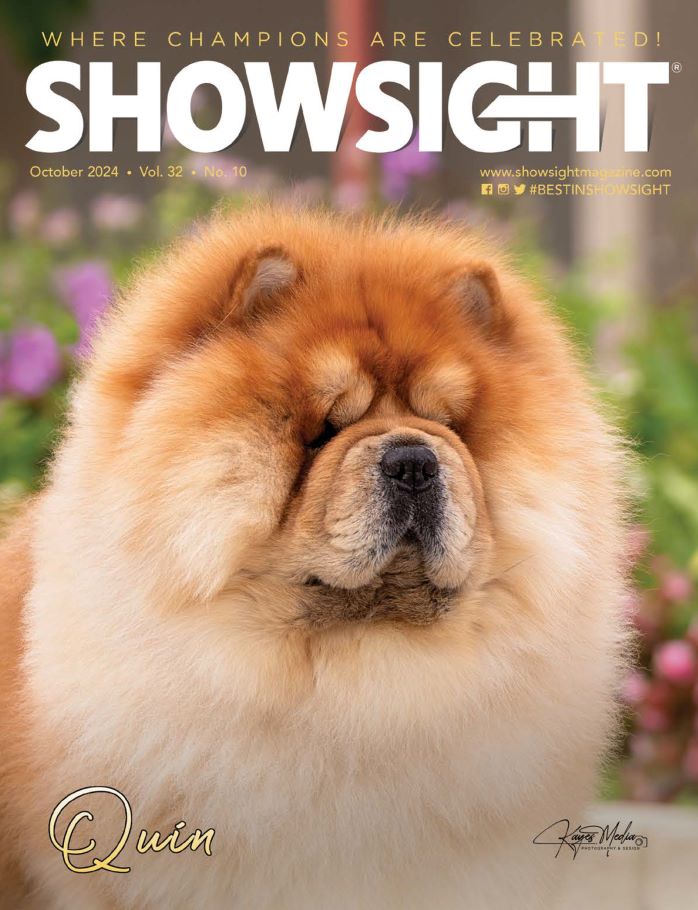An Interview with Junior Handler Taylor Del Duca
By John S. Contoupe
“The future of the world belongs to the youth of the world, and it is from the youth and not from the old that the fire of life will warm and enlighten the world. It is your privilege to breathe the breath of life into the dry bones of many around you.”
Tom Mann stated about his beliefs on youth and its purpose in the fabric of society. If the dog fancy is to blossom in the centuries to come, it will need well trained, well versed, well developed young leaders as its foundation. I have had the pleasure of meeting one of those and it is with the utmost honor that I introduce to the fancy, Ms. Taylor Del Duca. Taylor started showing dogs at age nine in 4-H and handling her terrier mix, Domino. Her first time competing in juniors in AKC was when she was eleven and by her side was Lola, the Pharaoh hound.
I inquired about Taylor’s role model and the person who showed her the ropes at her first shows. Maureen Del Duca, Taylor’s mother, recalls:
Maureen Del Duca: “Renee Wolfe, who at the time was our kennel club president, acted as a judge at one of Taylor’s first 4-H shows. Patricia Lester, who is an obedience trainer at our kennel club, also took a great interest in Taylor. They were both very encouraging and supportive.
Once Taylor started in AKC, we took lessons from a professional handler, Colton Johnson and his wife, Heather, at their facility. They were always very nice. A total stranger, Dovey Trotter, watched Taylor at her first show and approached me afterwards—she even took time to give Taylor some lessons as well. As far as showing the ropes, it had to be Dovey.”
Taylor shared:
“During my beginning years there were also many people, parents of other juniors or just other exhibitors, who would give me advice or work with me at shows. I did have some show experience already because of my participation in 4-H shows. The 4-H leaders taught me the basics of handling, which certainly helped me be prepared when I moved into AKC shows.”
I wanted to know about Taylor’s first dog in juniors. I prompted Taylor to describe the bond, the team work and the thrill of the first wins.
Taylor Del Duca: “My first dog in juniors was a Pharaoh Hound named Lola, that I still own. She was always very serious in the ring. Because I was also nervous in my first years showing, judges often thought that we were not having fun. She was also a very independent dog. I was young and unexperienced, and she didn’t always work for me. I always describe it as she is making me prove myself to her.
When I did start getting better she started to be more interested in the shows. She seemed more excited to be there with me. Initially I was really scared to start AKC. Even though I had shown before in 4-H, it had always been with people I knew, many whom I’d gone to school with and saw weekly at meetings. In the AKC shows I knew no one and I thought that everyone must be vastly more experienced than I was. When I started to actually win I was very excited. I thought, ‘I can actually do this!’”
Maureen adds, “As a mom, it was amazing to watch my child who was so quiet and shy take hold of the ring with Lola, who was as serious as she was… and dazzle.”
“Have you been supported by your parents, siblings and family friends while in juniors?” I asked.
Taylor Del Duca: “I have been supported very much by everyone who knows me. My parents give quite a bit of their time to see that I can attend shows. My mother is the one who usually takes me to the shows and she always helps a great deal while we are there. Many of my parents’ friends and even my friends follow me on Facebook. After a large win or big show they will often congratulate me when I get to school. They also know that I go to shows nearly every weekend and will often joke about if I had a dog show and then ask how I did.”
Maureen’s answer was more raw and a bit more pragmatic.
“Marlene Groves and her granddaughter Karissa Groves have become good friends through the sport. They have always been supportive and have become great friends, even when we have defeated them—they stay for BJH even if they are not in it and frequently stay for groups if Taylor has a dog in the group. To date, Karissa needs one more BJH for WKC and yet, even though we have beat her and they are aware Taylor has more than she needs to qualify, she and Marlene remain supportive friends.
On the other hand, on the darker side of this sport—a friendship was lost—Taylor’s best friend since kindergarten started AKC at the same time as Taylor (encouraged by us to do so). Her mother began to become more and more distant outside of dog shows, as Taylor began to do well and defeat her daughter more and more. They attended the same small school and at one show her mother stormed up to me and yelled, ‘When has your daughter won enough?!’ She then uninvited Taylor to a birthday party (age 12) and I observed Taylor’s then best friend pull away at school.
This was heart breaking for Taylor and I think this represents a current of win, win, win—at the expense of feelings— similar to parents watching their kids in other sports… it was very sad. This was devastating for me to see and I know it broke Taylor’s heart.”
This fancy has a dark side to it and it can at times take a great and unforgiving toll in friendships and lives. The competitive spirit must be reigned tightly and be kept at a healthy and pleasant level throughout.
I asked Taylor and her mother about her most favorable moments in her ongoing Junior career.
Taylor Del Duca: “I think some of my favorite moments would just be times where I was with friends I had made through the shows. As I showed in my area I saw people over and over and etched out friendships with them. It was really nice to have people who I could talk about, who would not need long explanation at the mentions of the words ‘stack’ or ‘breed standard’.”
Maureen Del Duca: “My favorite moment in her junior’s career was showing up as totally unknowns in the sport at the National when she was ten. Taylor and Lola took WB and Farley took WD—no one knew who we were. The next time we met up she repeated the feat. I felt fabulous then, because we had been so poorly treated. Farley finished with a third 5 point major at the Western.
She was also pulled for a run around the ring alone at our second national and the air in the room was sucked up, as everyone thought she was just about to take breed. Literally, there was a gasp! I know the judge was honoring her as a junior with skill and bravery to be alone in a ring full of the best of the best and she rocked that. Over all, it is thrilling to see her enter the ring expecting to win even when up against big names and faces. In the ring, she is confident and flawless and it is thrilling as a parent to watch that.”
“What has been the highlight as far as wins? Any funny, embarrassing moments that you recall?” I asked.
Taylor Del Duca: “I would have to say my favorite win was my first best junior. I had been trying very hard for a long time to get the win. So many shows it had gone to other talented handlers, but I was trying very hard for it. What made the win so memorable for me was that I was awarded it in my hometown. It was our show, and it was in a building that I had shown in 4-H many times before. The win made me feel as if things came full circle and that made my excitement that much better.”
“As I am sure anyone who had shown dogs knows, there is no shortage of embarrassing moments. So many that I don’t think I could even name them. Sometimes show grounds are loud and you don’t hear a judge or you simply do something stupid. I’d have to say the worst for me was when I listened to a direction wrong, and then the next time I showed to that judge I did it again. The second time it was less embarrassing simply because of the irony. It became a joke between me and my mom. His instruction was to go around one at a time. I was second in line and I took off with the girl in front of me.
My mom joked about it a couple years later—she kept saying, ‘Remember one at a time, one at a time’ so I went in the ring and took off again with the girl in front of me! When we ran across him again, my mom laughed and said, ‘One at a time, one at a time!” It was our standing joke. But in that third time, I got it right and won a BJH.”
I asked about any obstacles she had to overcome and how has she dealt with those. “Have they made you stronger?”
Taylor Del Duca: “I think my biggest obstacle was being nervous about showing. Even though I loved it from the start, having someone watching and judging what I was doing was difficult for me. As I became more confident in my showing abilities I started to worry less about the fact that I was being judged. I began thinking rather than that the judge was looking at me, that I should get them to look at my dog and show him off the best I could. I think that overcoming that nervousness has helped be a lot both in and out of the show ring. Getting over a little of my nervousness in the show ring gave me skills that I use to help with situations outside the show ring.”
Maureen’s recipe to survive this happily and advice are based on a few points.
- Always congratulate the winner.
- Parents can be awful.
- As you become better—you are not everyone’s friend anymore.
- Some judges really should not do juniors. Some love it and should be commended.
- Sometimes politics are obvious—even in juniors. All these are the negatives, but I think what I have learned and what Taylor has learned is—be yourself. Ignore mean people and just do your thing. Not every loss is fair and you just have to roll your eyes in private, roll up your sleeves and move on.
I wanted to know about some of the lessons that she had learned while in the junior program.
Taylor Del Duca: “There have been so many that I could probably write a book (and some people have). I have learned lessons that apply inside the show ring and those that apply outside the show ring. The junior’s program has helped me learn a lot of responsibility. Juniors are expected to be fairly independent and know how to handle themselves in a professional way. Those skills in responsibility and self-management can be applied to my life outside of dog shows.
Juniors, even more so than regular exhibitors, are expected to know about their dogs and have a bond with them. Knowing how to care for and work with my dogs has taught me a lot of patience and perseverance. Animals don’t always want to do what you ask them to do, and I have had to learn to be relaxed when my dogs are being difficult.”
I asked, “What would you like to see change in the junior program? What do you think works great?”
Taylor Del Duca: “If anything, I would like to see the Master Class either go away, or be better managed. It is nice to have competition that is at the same skill level, but Masters have a lot of pressure to take Best Juniors rather than simply class wins because for most of the year (at least in my region) Masters is small. I even had no class completion for many months this year. I have heard from other juniors that along the coasts Masters is not as small, in which case I think it is a good system.
For me personally I am often competing against myself or one other person for about half the show season. If I do not take a Best then my rankings suffer. Due to the fact that there are small Master class sizes, Seniors and Intermediates are awarded Bests often over Masters with little competition. When I would compete alone, or in small classes I would often not be given the same amount of time (and sometimes not even the same ring procedure) as the other classes which did not allow me to show off my skills in the same way that the Seniors or Intermediates could.
“I think that the age requirement and the Novice classes actually work very well. In my experience the changes between Junior to Intermediate and Intermediate to Senior corresponded well with changes in my overall skill level simply because of my age and experience. I enjoy the fact that juniors are expected to be able to do more with their dogs in the ring. Because juniors are supposed to do more with their dogs, they are forced to learn how to train and customize their handling to their dogs, which I believe makes a well-rounded handler.”
I wanted to know more. “As far as the system and the number of wins required, is it a fair system? Is there room for improvement?”
Taylor Del Duca: “I believe that the system was better before the implementation of the Master class. Although I understand its purpose, I think that it has diminished the competition in the Open classes. As I understand it, the purpose of the Master class was to put top-performing juniors together, so that the skill level was better balanced between the classes. I think that it is unfair not only to those placed in the Master class, who often lose their national ranking because the class is quite a bit smaller than the others for most of the year, but also to those who are left in the Open classes and are being rewarded for a performance that would not have been up-to-par before.
I am glad that the requirements for moving into the Master class have changed for the upcoming show year, because getting ten class wins in Open Junior is very different than ten class wins in Open Senior. My only worry about the requirement being changed to Best Junior wins is that Masters will become even more exclusive so that those who do move into it early will be even more pressed to take Bests.”
Overall, Taylor states: “I would only like to say that even though there are some flaws in the juniors system, it has been very enjoyable to have an outlet where people my age can be judged and compete against each other without the influence of the quality of the dog we are handling or age. I would really like to see juniors be supported more in the future because it truly is a great program that yields a lot of benefits for those who work at it.”
It has always been very important to me to see all breed clubs and breed clubs supporting Juniors during their journey and development, both emotionally and financially. “How do you feel about monetary support from your parent club, AKC and any other dog organizations? Have you received any?”
Taylor Del Duca: “I have received monetary prizes from two awards of merit at my regional competition and two other scholarships. On many occasions my wins have also been accompanied by gift certificates to vendors or gift cards. I personally enjoy these prizes a lot. They are very helpful for me because I am saving for college. I also really love being able to use the ‘vendor bucks’ because I will usually buy my dog a toy for his work or something that we need for the shows. It’s very helpful to be able to purchase tangible and useful items as rewards for wins, rather than simply getting points for rankings.”
Taylor’s mother also supports this and shares her feelings about it in a positive manner, “The newer trend for junior scholarships is great—it shows a true support of the future of the sport and the future for the junior. Taylor has received two scholarships at the central regionals, a scholarship this year at the march Vegas show, a scholarship at the Arapaho Kennel Club show and has received many nice gift cards—her total in scholarships to date is $2800 in scholarships. I also have seen a hopeful trend of much younger, new juniors judges—I hope it continues.”
I inquired what had been her biggest goal as a junior.
Taylor Del Duca: “My biggest goal was simply to be happy with the way I handle dogs. I have very much achieved that goal. I think I am able to not only show my dogs to the best of my ability, but have been able to be a knowledgeable enough handler, that I can show others’ dogs as well.”
I also asked about the opposite side of the rainbow. “What has been your biggest disappointment as a junior? How have you dealt with it and what could be done to avoid it?”
Taylor Del Duca: “Unlike many juniors who I have spoken to, I don’t set a lot of goals for winning. I don’t like to say, ‘I want this many wins by this time,’ or ‘I want to qualify for this.’ To me, that lowers any disappointments. I just enjoy showing up and trying hard at the shows. When I do qualify for a show such as Westminster or Eukanuba, it is definitely rewarding—but I try not to expect it.”
“What is your advice for the upcoming generations of juniors? Is there a recipe in being successful in this or would you rather advise them to go with the flow?”
Taylor Del Duca: “I would say for new juniors, the best advice I can give is to try everything. People are going to give you advice and it doesn’t hurt to try what someone says at least once. If you try different techniques, you will eventually find what makes your dog look good and what is easiest for you. If you are comfortable with your handling and know that you look good doing it, you will be far more successful.
When I was starting, I often got many tips from observers who watched juniors and would contribute their knowledge. Even now, win or lose, I ask judges what they were looking for, or what I could improve on. Despite having been in juniors as long as I have, I still get advice that has helped me improve. Long-winded-answer-short: take advice from others and try it because you don’t know what will work for you unless you do.”
“Are there any messages you would like to leave the fancy with as far as juniors, the way they are treated and the good and not so good things about junior showmanship?”
Taylor Del Duca: “I think where juniors really get looked down upon is in the breed rings. Though I have met many judges who adore having juniors on quality dogs, I have also seen judges who will overlook a quality dog because there is a junior handling it. There seems to be a double standard where juniors are encouraged to show their dogs in breed and to exhibit dogs that fit their standards, while simultaneously believing that a junior will not be showing a top-winning dog.
Another issue I have encountered is kennel clubs not treating juniors as a valid competition. What I mean by this is, that I have been to shows where the junior’s classes were going at the same time as the group rings or owner handler rings. To me, that says that the kennel club does not expect juniors to have a dog in groups or owner handler. Just as the clubs cannot have two groups going off at the same time, I think it should be the same with juniors.”
I wanted to hear Taylor’s solution to some of the problems that the fancy is facing.
Taylor Del Duca: “I think that most people understand the importance of juniors, but don’t always take actions to support us. I have heard of many clubs (including my own breed’s) which do not offer a junior competition at their specialties. I think it discourages junior participation in those breeds and discourages juniors from carrying on with them in some cases.
Overall, I think that juniors should be celebrated more than they currently are in order to make it appeal to more young handlers. I know that some people prioritize showing in their breed over juniors, or simply choose not to do juniors at all, because the rewards of the breed competitions are greater than juniors. It is definitely a hard problem to solve, which is why I can’t exactly suggest specific ideas at this time, however I think that the possibility for that improvement is possible if the effort is made.”
It was of the greatest importance for me to know about the pleasantness of her overall experience.
Taylor Del Duca: “Definitely, it has been. Caring for the dogs and spending weekends together have brought me and my mom together, especially since she is the one to go to most of the shows. My dad has been involved as well. Though he doesn’t attend many shows, he makes sure that the RV it is in good condition so we can use it. I think that the shows have really given each of my parents something to support me in, outside of school.”
As our chat was coming to an end, I wanted to know how Taylor felt about the dog fancy’s blessings and shortcomings. “What do you are the biggest obstacles that the fancy is facing?
Taylor Del Duca: “I would say the biggest issue being faced by the dog show world is a lessening of participation. Obviously I have not been in the sport for as long as most people, but even in my time involved in shows, I have seen the size of juniors classes decrease. The reason I talk only of the size change in juniors is that we will be the future of the sport. A decline in juniors undoubtedly means there will be less adults participating in the future.
I would say that a large factor in deterring some people from dog shows would be the politics that tend to be present. Professional handlers are often favored on namesake when competing against owner-handlers and especially juniors. Yes, sometimes a professional has a very nice dog and deserves all the winning that they get, but not always. If a person thinks that there is little hope for them to win, they would be less inclined to spend the money and time to participate.”
“Do you believe that the junior program has adequately prepared you to become a responsible and ethical dog fancier and why?”
Taylor Del Duca: “I think that it has. I have not only learned skills about handling, grooming and caring for my dog, but I have also met people throughout the dog show community who are more experienced and could further connect me to others. Dog shows highly emphasize the bettering of dogs through breeding. Juniors has expanded my knowledge of dog standards and ownership as a whole, which I believe prepares me to have healthy, show-quality dogs in the future.”
I wanted to know if Taylor Del Duca has a heart dog.
She said, “My heart dog is definitely my current juniors dog, Farley. He is very affectionate and laid back. He just seems happy to be with me. He is also really goofy and always makes me laugh. I know all his quirks and how he acts. I’ll admit that I let him sleep in bed with me. Out of our current four Pharaoh Hounds, he is the only one not to have chewed up something of mine, which is a bonus.”
“Who do you give the most credit to for your advancement and support while being a junior?”
Taylor Del Duca: “It’s really hard to say. Juniors has been such a journey for me and I have been helped by so many people along the way. Obviously my parents have been very influential, especially my mother since she is at every show. I think my dogs deserve an honorable mention here as well. Each one of my Pharaoh Hounds is very different, both in how they act and how they are shown best. Because of their differences I really have been able to become a well-rounded handler.”
“A confident handler performs best,” I’ve always said. I wanted to know if my theory was true. So, I asked. “What is the most valuable lesson this experience has taught you? “
Taylor Del Duca: “I would have to say the most valuable lesson that I have learned is to be proud of what you accomplish no matter what it is. Even if you lose, being able to say, ‘I tried really hard and am happy with how I showed,’ is very rewarding. There have been times where I was very confident and happy with my handling and did not win and I was alright with it because I accomplished what I aimed for. When I go to a show I am happy to leave without a ribbon if I thought that I did a good job and the placements were fair. Juniors has really helped me figure out that it is sometimes more rewarding to be proud of yourself than to be the best.”
As someone once said, “Youth is happy because it has the capacity to see beauty. Anyone who keeps the ability to see beauty never grows old.” I saw a lot of beauty through the eyes of Taylor. I also saw incredible maturity and a gift to see the positive, before the pragmatic and at times negative are seen. My wish is that the fancy will actually listen to the voices of the juniors and take their wise and fair input into much needed consideration. It is the juniors who truly learn the ways of the dog fancy and it is these very same juniors who will someday inherit it and make sure that this complicated machine keeps on ticking in an efficient and productive manner.
Taylor—it has been a true pleasure and honor and I hope that your voice will be heard in a brilliant and lucid manner. I wish you continuous success in your remaining years of involvement in junior showmanship and I hope that your input brings much needed change within the fancy and the way some perceive the junior showmanship aspect.
Taylor’s Pharaoh hounds have done quite well in her capable hands. Farley is ranked number three in the breed, while Titus is number nine in the breed and her Rhianna is ranked number eleven in AKC stats. In National Owner Handler Series stats, Titus is ranked #2 and Rhianna is right behind him in the third spot. Taylor has won a BIS NOHS with Titus. Taylor Del Duca is currently ranked as the number one Pharaoh Hound Junior and has been since 2010. She is also proudly claiming the number two overall Hound Junior spot. Shine on Taylor, shine on.
From the Showsight Archives: November 2015 Issue. Click to subscribe.









